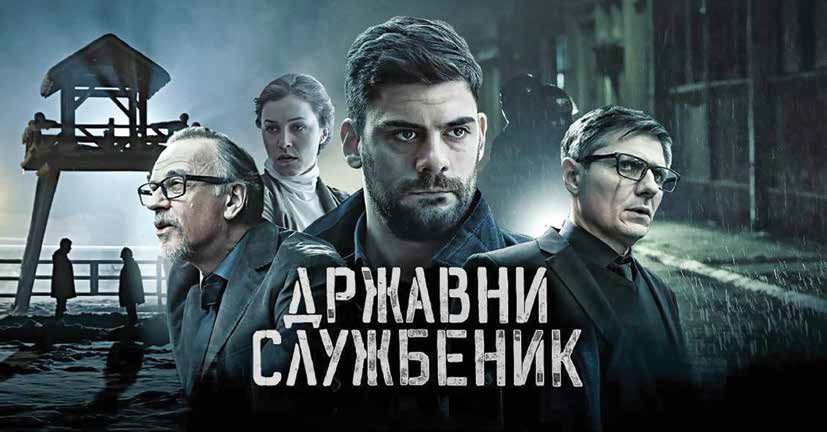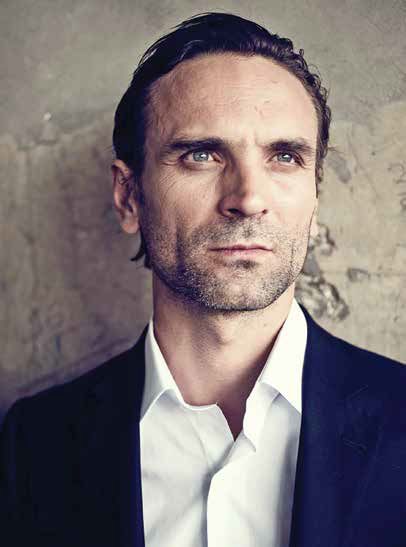Why are foreign diplomats in the Serbian hit series “Besa” and “Državni Službenik” shown mainly in a negative light, as corrupt and unethical bureaucrats who often resort to crime to satisfy their own passions or financial interests?
Today’s television space in Serbia is characterized by a “war of content” between two cable operators, SBB and Telekom, like never before. This clinch is reflected in the mass production of new feature series by the old/new TV channel Nova S (formerly known as TOP), on the one hand, and MTS, on the other, with its pool of TV stations with the national frequency, such as Pink, Prva and O2.

This is also a local culmination of the global game-changing trend that is emulated in the rivalry and series production of Netflix and HBO platforms. In Serbia, we have new genres that characterize the new Serbian, post-comedic, television time schedule embodied in the three seasons of the thriller “Ubice Mog Oca” and the period drama “Senke Nad Balkanom” which will start its second season in the autumn. They have also paved the storyline direction that has always fascinated Serbian audiences and filmmakers through the synthesis and permeation of criminal groups, on one side, and secret services and foreign intelligence centres in Serbia, on the other.
The said obsession was dramaturgically processed by two of the most popular playwrights in the country, Branislav Nušić and Dušan Kovačević, in their famous dramas – “Sumnjivo Lice” and “Balkanski Špijun” during the 20th century which was also known as the theatre era.
In this public, artistic discourse, and after the breakdown of socialism and the disintegration of Yugoslavia, the self-ironic humour depicted in the series “Bolji Život” dominated the narrative of an ordinary man living in the system during the transition, with countless franchise variations and re-runs. It is simply unbelievable to see that, despite the ongoing wars in this region, only two films (“Balkanska Pravila”, from 1997 and “Četvrti Čovek”, from 2007) actually had a plot centred around the security-contaminated ecosystem in the country where the abbreviations UDBA, KOS and DB were the axioms of mystification.
The aforementioned “Senke Nad Balkanom” was actually the first series that produced the effect of reaction to the negative portrayal of the Russian emigration, if you read between the lines. On the surface, this was a clash between different worlds back then – criminals and police – similar to the one depicted in the British series, Peaky Blinders.
However, many different characters and motives from occult mysticism have pushed aside the ins and outs of the work done by public and secret diplomacy, which could mean that, in the continuation, this will be new suspense. Truth be told, the Serbian standard could be likened to the cartoon character called Calimero who often feels wronged, as we do when official Washington, London, Paris, Berlin and Moscow are supposedly working behind our backs.

And this is finally being legitimized and opened up as a topic in the two best new series production-wise, one of which is broadcast on a channel of Telekom Serbia, which is still state-owned for the most part.
The first series is “Besa”, a story of personal and family drama told through the filter of the relations inside the Balkan – Albanian drug cartel and its alleged enemy, the international administration, comprising from the local Interpol representatives to the delegated European officials, i.e. the advocates of the emancipation of the newly formed mini-states. Regardless of the reason, in the traditional roles of villains, stemming from the once dominant genre that was the Partisan films, this time around or yet again, the Germans are the bad guys, resembling photo-robots of corrupt bureaucrats from Brussels, portrayed through the character of a director of the Kosovo Privatization Agency and his superior, Elsa from Austria, who also happens to be a European MP. Besa was made in the co-production of Adrenalin and Red Planet Pictures.
In the series, Uroš Perić is a family man from Belgrade, Dardan Berisa is the godfather of the Albanian-Montenegrin mafia along with a Serbian/Kosovar police inspector, Petrit Koci. There is also a myriad of other important supporting actors. The series is a reflection of our reality, of our intersected but apparently different paths, of the transient tests and our own choices, in the final sum of our altered lives. The handicap of this extraordinary series, which is the first significant Serbian – Albanian co-production, notwithstanding the fact that the Albanians are portrayed in the well-known clichéd manner which can be likened to Hollywood’s portrayal of Serbs, is, in fact, its limited visibility. Besa was made in the co-production of Adrenalin and Red Planet Pictures.
The exclusivity of MTS cable was surpassed by the added terrestriality (i.e. by being broadcasted at a national frequency of PINK television) of the newest series called “Državni Službenik”. We just saw the series’ third episode, out of 12 in total. Moreover, this will be the first series entirely dedicated to the bureaucracy in state security but in accordance with the latest trend of subtle and soft rehabilitation of Serbian state policy from the last three decades.
“Državni Službenik” is not focused on the inside enemy, which is something that permeated our recent history with the likes of Jovica Stanišić and Rade Marković, but, just like its US counterpart, “Homeland”, it is fixated on external friends/enemies of the state and their satellites. This is reminiscent of the James Bond-like profile of the Yugoslav state services chief, Stane Dolanc, as it focuses on emigration as an inside enemy and on prominent mythologized executioners in the state service. The main characters are the young BIA agent and his closest colleagues, who interact with “persons of interest, security-wise”.
Both the series director and screenwriter did not shy away from planting triggers in the shape of intrigues and implications, involving, first and foremost, the diplomatic representatives of the German Embassy by putting them in controversial situations which are in the direct breach of the Vienna Convention on Diplomatic Relations. Plus, there are also naïve details like the main character having an insider in the US Embassy.
The traditionally suspicious English and French diplomats were not portrayed in a typically dramatic fashion. One of the dramaturgical segments of these characters is based on urban myths that the NGO and the diplomatic corps stationed in Belgrade have about our people who have worked for many years in the embassies of the Western superpowers.
If, in the end, we abstract the secondary subgenres like more or less urban or completely rural domestic telenovelas, teenage series like “Jutro Će Promeniti Sve”, historical projects such as the unsuccessful series that was “Nemanjići” or the successful one like “Koreni”, based on Dobrica Ćosić’s book about contemporary Serbia, the aforementioned series provide an authentic and subliminal testament, with more or less internally or externally directed subversiveness.
Series are the new books you simply have to read, as well as a business which in Serbia, just like in the rest of world, brings bigger profit than construction. As a result, various characters, who were not previously engaged in construction or art, are now swaying towards TV production. Anthropologically speaking, today’s series are not going to generate any significant reference like the supremely popular, now digitized series “Salaš u Malom Ritu” from the 1970s. But, at least, they draw an intriguing, sociological sketch of the society and the political image of the Serbian (deep) state.
Text: ZLATKO CRNOGORAC